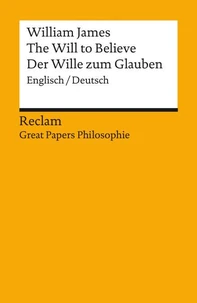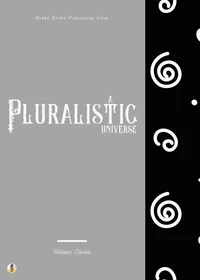The Will to Believe, and Other Essays in Popular Philosophy
Par :Formats :
Disponible dans votre compte client Decitre ou Furet du Nord dès validation de votre commande. Le format ePub est :
- Compatible avec une lecture sur My Vivlio (smartphone, tablette, ordinateur)
- Compatible avec une lecture sur liseuses Vivlio
- Pour les liseuses autres que Vivlio, vous devez utiliser le logiciel Adobe Digital Edition. Non compatible avec la lecture sur les liseuses Kindle, Remarkable et Sony
 , qui est-ce ?
, qui est-ce ?Notre partenaire de plateforme de lecture numérique où vous retrouverez l'ensemble de vos ebooks gratuitement
Pour en savoir plus sur nos ebooks, consultez notre aide en ligne ici
- Nombre de pages315
- FormatePub
- ISBN859-65--4704541-0
- EAN8596547045410
- Date de parution02/06/2022
- Protection num.Digital Watermarking
- Taille502 Ko
- Infos supplémentairesepub
- ÉditeurDIGICAT
Résumé
William James's 'The Will to Believe, and Other Essays in Popular Philosophy' is a seminal work that explores the intricate nexus between faith, belief, and human experience. Through a series of essays, James employs a pragmatic literary style that is both accessible and intellectually rigorous, investigating the conditions under which belief is justified. He argues against the notion of belief as a purely rational decision, proposing instead that our inherent instincts and passions shape our convictions, even in the absence of irrefutable evidence.
This philosophical exploration is situated within the context of 19th-century American thought, drawing on existential questions prevalent during a period marked by scientific advance and cultural transformation. James, a pioneering philosopher and psychologist often referred to as the father of American pragmatism, draws from his vast intellectual background and personal experiences in shaping his arguments.
His work is profoundly influenced by his belief in the importance of individual autonomy and subjective experience, which resonates throughout his writings. This book reflects his commitment to engendering a philosophy that is not only theoretical but is also applicable to everyday life, making philosophical inquiry relevant to the broader public. For readers seeking insights into the interplay between belief and action, 'The Will to Believe' is a compelling read.
It offers profound reflections that challenge conventional notions of rationality while encouraging readers to embrace the complexities and nuances of their convictions. As such, this book is not only a critical text in philosophy but also a practical guide for those exploring their own beliefs in the face of uncertainty.
This philosophical exploration is situated within the context of 19th-century American thought, drawing on existential questions prevalent during a period marked by scientific advance and cultural transformation. James, a pioneering philosopher and psychologist often referred to as the father of American pragmatism, draws from his vast intellectual background and personal experiences in shaping his arguments.
His work is profoundly influenced by his belief in the importance of individual autonomy and subjective experience, which resonates throughout his writings. This book reflects his commitment to engendering a philosophy that is not only theoretical but is also applicable to everyday life, making philosophical inquiry relevant to the broader public. For readers seeking insights into the interplay between belief and action, 'The Will to Believe' is a compelling read.
It offers profound reflections that challenge conventional notions of rationality while encouraging readers to embrace the complexities and nuances of their convictions. As such, this book is not only a critical text in philosophy but also a practical guide for those exploring their own beliefs in the face of uncertainty.
William James's 'The Will to Believe, and Other Essays in Popular Philosophy' is a seminal work that explores the intricate nexus between faith, belief, and human experience. Through a series of essays, James employs a pragmatic literary style that is both accessible and intellectually rigorous, investigating the conditions under which belief is justified. He argues against the notion of belief as a purely rational decision, proposing instead that our inherent instincts and passions shape our convictions, even in the absence of irrefutable evidence.
This philosophical exploration is situated within the context of 19th-century American thought, drawing on existential questions prevalent during a period marked by scientific advance and cultural transformation. James, a pioneering philosopher and psychologist often referred to as the father of American pragmatism, draws from his vast intellectual background and personal experiences in shaping his arguments.
His work is profoundly influenced by his belief in the importance of individual autonomy and subjective experience, which resonates throughout his writings. This book reflects his commitment to engendering a philosophy that is not only theoretical but is also applicable to everyday life, making philosophical inquiry relevant to the broader public. For readers seeking insights into the interplay between belief and action, 'The Will to Believe' is a compelling read.
It offers profound reflections that challenge conventional notions of rationality while encouraging readers to embrace the complexities and nuances of their convictions. As such, this book is not only a critical text in philosophy but also a practical guide for those exploring their own beliefs in the face of uncertainty.
This philosophical exploration is situated within the context of 19th-century American thought, drawing on existential questions prevalent during a period marked by scientific advance and cultural transformation. James, a pioneering philosopher and psychologist often referred to as the father of American pragmatism, draws from his vast intellectual background and personal experiences in shaping his arguments.
His work is profoundly influenced by his belief in the importance of individual autonomy and subjective experience, which resonates throughout his writings. This book reflects his commitment to engendering a philosophy that is not only theoretical but is also applicable to everyday life, making philosophical inquiry relevant to the broader public. For readers seeking insights into the interplay between belief and action, 'The Will to Believe' is a compelling read.
It offers profound reflections that challenge conventional notions of rationality while encouraging readers to embrace the complexities and nuances of their convictions. As such, this book is not only a critical text in philosophy but also a practical guide for those exploring their own beliefs in the face of uncertainty.











